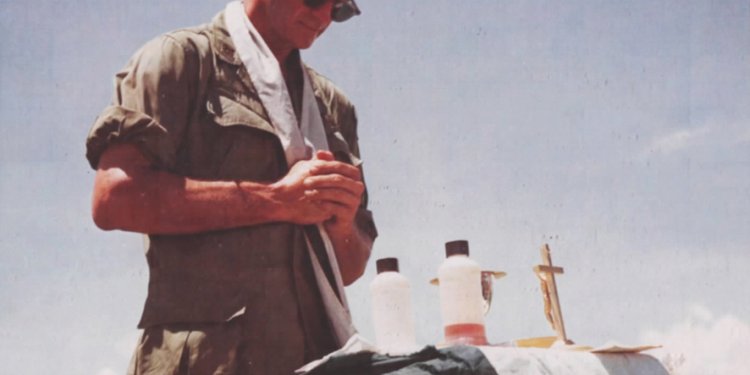Many Medal of Honor Recipients have stated that the Medal is one that no one wants. For many, it represents the worst day or days of their life. Worn around the neck, for many Recipients, the small medal represents a large burden. An expectation to live their lives above and beyond, just as they went above and beyond in battle. Despite the weight many Recipients feel in carrying the Medal, only one has ever gone so far as to publicly renounce it.
Born on Valentine’s Day in 1931, Charles Liteky’s childhood was shaped by his father’s Navy service. After two years of college, he transferred to a seminary and was ordained in 1960. Liteky worked for several years in churches in New York under the Catholic name Angelo before joining the Army as a chaplain.
In Vietnam, Liteky was well-liked and much admired by the young men whom he served. He earned the respect and trust of the men in his unit by being ever-present. Liteky joined operations, went on patrols, and slept in the field with his men. He was remembered as being someone who put others at ease and was easy to talk to. Throughout his life, Liteky was motivated by a desire to save lives.
Nowhere was this motivation put to the test as in Vietnam on December 6-7, 1967. As was often the case, Liteky joined the men of Company A, 12th Infantry, 199th Light Infantry Brigade on a search and destroy operation. Unarmed, he was there to support, not fight. When a larger North Vietnamese force attacked the company, Liteky ran to the aid of two wounded men, carrying them to their landing zone for evacuation. This inspired the men of the company, who rallied and began fighting back.
As the firefight raged, Liteky could be seen walking, upright, moving from wounded man to wounded man. He administered last rites where there was no hope and evacuated those who stood a chance of survival. At one point, he crawled, back against the ground, with a larger man lying on his chest. As the medevac helicopters began to arrive, Liteky ignored his own safety to direct the helicopters in and out, sending the wounded off to life-saving care.
On the morning of the 7th, Liteky’s unit was relieved. Despite wounds to his foot and neck, Liteky had carried more than 20 men to the landing zone so that they could be evacuated. He later estimated that he performed last rites for at least 30 men. Liteky later stated that his motivation in combat was “a humanitarian commitment. I had something to inspire me to overcome my ordinary moral instincts that cried out for survival.”
That humanitarian commitment stayed with Liteky far beyond the battlefields of Vietnam. He received the Medal of Honor in 1968 and left the Army in 1971. For a few years, he survived on his Medal of Honor pension, living in a cabin in Florida for a time and then working at a halfway house for Veterans in Ohio. Frustrated with certain aspects of the Catholic Church, Liteky left the priesthood in 1975.
In 1983, he married Judy Balch, a former nun. Balch introduced him to refugees from El Salvador and the plight of many refugees from Central America. Through them, Liteky learned of the torture and murder many had faced under the dictators who ruled their native countries. Motivated by his long-held desire to save lives, Liteky became a bold activist.
From the mid-1980s into the early 2000s, Liteky participated in numerous peaceful protests. He was imprisoned twice for trespassing as part of a protest at an Army school in Georgia. In his last months imprisoned at Lompoc Prison, Liteky was placed in solitary confinement for refusing to work for the prison, deeming the industry immoral. Supporting a variety of causes in his activism, Liteky, who had seen the horrors of war, always urged peaceful protest and an end to violence.
His loudest protest may have also been his most silent. On July 29, 1986, Liteky left a large folder at the Vietnam Veterans Memorial. The outside read “Contents: Medal of Honor Renounced 7:29:86; In protest of U.S. intervention in Central America, ANOTHER VIETNAM.” Inside were his Medal of Honor and a letter to then-President Ronald Reagan. In the letter, Liteky renounced his Medal of Honor and expressed his opposition to US intervention in Central America.
Several days later, Liteky was quoted in a newspaper article, stating, “I find it ironic that conscience calls me to renounce the Congressional Medal of Honor for the same basic reason I received it—trying to save lives.” In September, Liteky and other veterans began a “Fast for Life,” refusing food to protest US involvement in Central America. The fast came to an end after six weeks, but demonstrated once again that Liteky, as he had in Vietnam, was willing to risk his own life to save others, on the battlefield and off.








